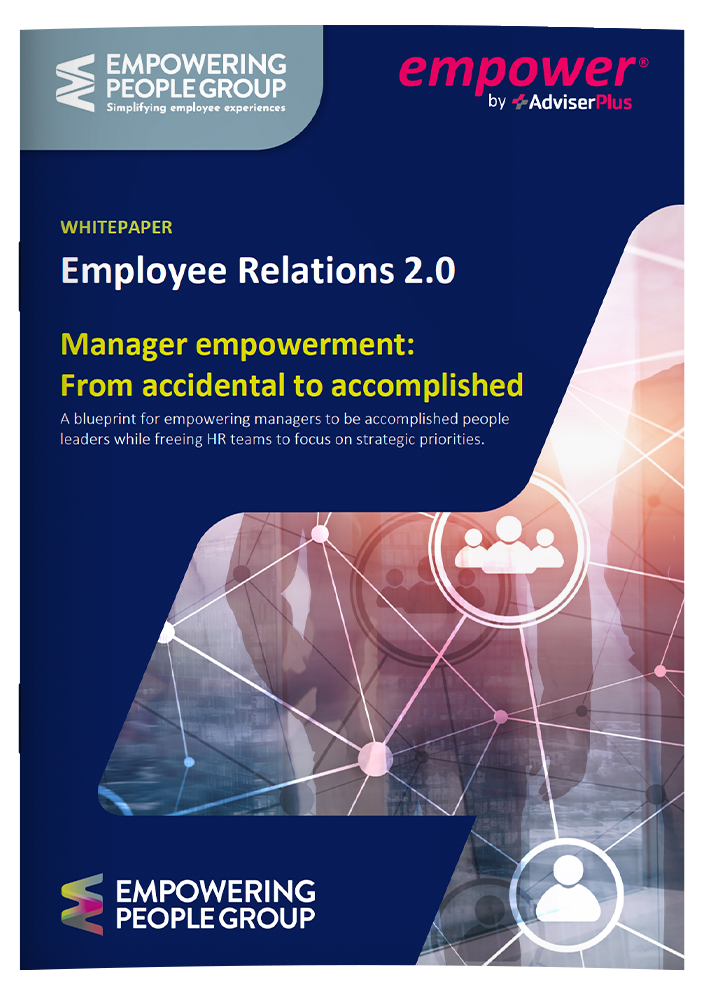Britain’s workforce crisis: UK managers are the least engaged in Europe
A recent report, ‘State of the Global Workplace‘, has revealed a troubling reality: the UK workforce is one of the least happy and engaged in Europe. 26% of UK employees regularly report feelings of sadness, second only to Northern Cyprus. And only 10% of UK workers report feeling truly engaged at work. Most concerning of all, managers were the least engaged group across all categories.
This widespread disengagement carries a steep cost for organisations, especially when it starts with managers. It manifests into falling morale and performance, increased sick days and mounting retention challenges. These aren’t isolated symptoms, they’re warning signs that traditional, top-down approaches to people management are no longer effective.
Disengaged managers impact workplace culture
Disengaged managers affect every aspect of the business, from performance and wellbeing to retention and team culture. When managers are disengaged themselves, they may lack the motivation, energy, and confidence to lead effectively, let alone inspire engagement in their teams.
It becomes a cascading problem that spreads throughout the organisation. Rather than focusing on strategic priorities, HR is pulled into reactive firefighting, handling issues that should be part of everyday leadership. These include:
- Low-level conflicts;
- Performance concerns;
- Wellbeing matters.
As a result, HR teams become bogged down in tactical casework, stretched thin and unable to focus on long-term goals. Over time, this reactive loop fuels burnout in HR, frustrates already-disengaged managers further, and reinforces a culture where accountability is unclear and improving employee experiences stalls.
Read our whitepaper, “From accidental to accomplished managers“, to explore why manager capability is one of the biggest barriers to successful HR transformation, and how empowering managers is key to improving employee experience and driving lasting change.
Why a manager-first ER model is the fix HR needs
To reverse this trend, we must rethink the role of both managers and HR. At the root of the problem is too many organisations rely on outdated management models where HR acts as the default problem-solver and managers lack the tools or confidence to lead people effectively. This approach:
- Slows ER case resolution;
- Weakens accountability at the team level;
- Floods HR with avoidable ER cases;
- Undermines trust in managers.
In a fast-changing, hybrid workplace, this model is no longer sustainable. It creates a dependency loop that damages engagement and limits HR’s ability to drive meaningful change.
So, what’s the alternative?
HR gains strategic capacity by empowering managers
The alternative is a shift toward a proactive, manager-first approach, where HR enables and empowers, rather than replaces, managerial leadership.
To break the cycle, organisations must redefine the role of managers and reposition HR as an enabler. That means:
- Building confident, capable managers through continuous leadership development.
- Embedding clear ownership of people responsibilities within the manager role.
- Creating systems of support, not substitution, with HR as a coach and adviser, not a crutch.
- Building a culture of shared responsibility for people outcomes across all levels of leadership.
This isn’t about removing HR from the equation. It’s about unlocking strategic capacity by putting day-to-day leadership where it belongs: with line managers.
Real results: Transforming employee relations through manager ownership
The impact of a manager-first employee relations (ER) model speaks for itself:
- Over 90% of people matters handled directly by line managers, not HR.
- 5 in 8 ER cases resolved without any HR intervention.
- Full benefits of tech-enablement realised within just 3 months.
These aren’t theoretical wins, they’re measurable outcomes showing how shifting ER case management ownership to managers unlocks capacity, boosts accountability and accelerates culture change.
Read real results organisations are seeing from empowering managers here.
Key enablers of a manager-first ER model
Manager disengagement is more than a morale issue, it’s a signal that processes need to evolve. A manager-first ER model succeeds when it’s built on three pillars: practical tools, ongoing support and clear ownership.
-
On-demand ER case coaching for managers
Give managers real-time, intuitive digital guidance tailored to your policies, culture and values, so they can address ER issues confidently and consistently.
-
Practical training to build manager capability
Move beyond box-ticking compliance. Use scenario-based learning that helps managers navigate grey areas with empathy and fairness.
-
Digital tools for ER case consistency
Self-service doesn’t mean “go it alone”. Empower managers with self-service tools to document, track, and escalate cases to HR, only when necessary. With user-friendly dashboards, HR retains oversight, enabling trend analysis and proactive intervention when needed.
-
Culture reset: from escalation to ownership
Changing culture starts with redefining leadership. Equipping managers and deescalating ER cases to HR sends a clear message: we trust you to lead, and we’re backing you to succeed.
HR should champion this now
The data is a wake-up call. Disengagement, especially among managers, is rising. The answer isn’t more HR involvement. It’s more capable, engaged managers leading from the front.
By shifting from a culture of escalation to one of manager-led ownership, organisations build trust, reduce burnout and improve engagement and organisational health.
The opportunity? Reignite manager motivation, reduce HR burnout, and build a more engaged, accountable culture from the ground up. This is how culture transformation is achieved: “We trust our managers. We invest in them. And in turn, they’re ready, and motivated, to lead.”
Interested in building a manager-first culture? Get in touch to find out how we can help or explore transformative solutions here
